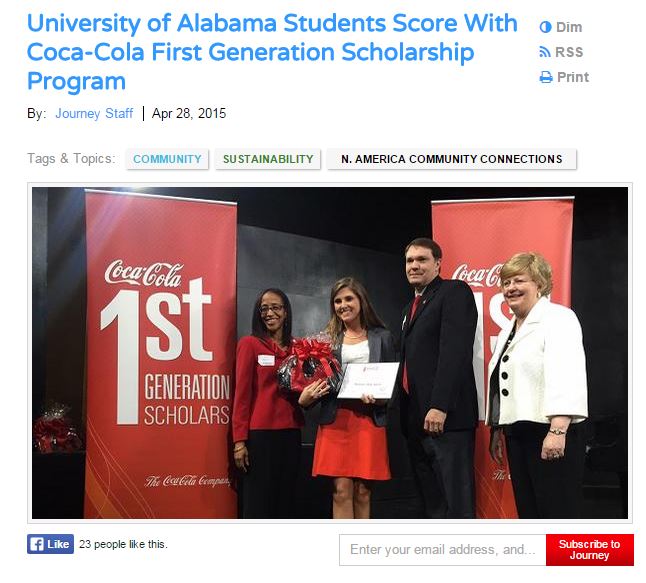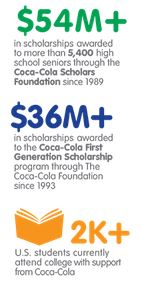STUDENTS SCORE WITH COCA-COLA FIRST GENERATION SCHOLARSHIP PROGRAM
STUDENTS SCORE WITH COCA-COLA FIRST GENERATION SCHOLARSHIP PROGRAM
By: Journey Staff Apr 28, 2015

James Ha’s parents instilled in him a hunger for a life bigger than they had known. As Vietnamese immigrants with very little education, his parents worked hard most of their lives to get to America, in search of greater opportunity for their children. There was never any question that their American born son would attend college but, with soaring tuition costs, they worried if they could afford it.
Discovering The Coca-Cola First-Generation Scholarship program at the University of Alabama made it possible for Ha to pursue what his parents could not; a college education. It opened the window of hope he so badly needed. Now a rising senior in Management Information Systems, Ha says this scholarship made it possible to fulfill his families’ dreams.
“I had never heard (of) anything like it,” Ha says, recalling his search for potential scholarship options.
Being an Alabama resident, having at least a 3.0 grade average, and coming from an immediate family who did not attend college made him eligible to apply.
 Since 1993, The Coca-Cola First Generation Scholarship program has supported students who are the first in their immediate family to attend college or university. The program has committed over $36 million in scholarships, provided to more than 2,800 students on more than 500 campuses around the country. As the first public university to host the program in 2006, the University of Alabama has molded its program into a model for all others. In 2014, Coke renewed the scholarship program at University of Alabama for the third time, with a $1million commitment over four years.
Since 1993, The Coca-Cola First Generation Scholarship program has supported students who are the first in their immediate family to attend college or university. The program has committed over $36 million in scholarships, provided to more than 2,800 students on more than 500 campuses around the country. As the first public university to host the program in 2006, the University of Alabama has molded its program into a model for all others. In 2014, Coke renewed the scholarship program at University of Alabama for the third time, with a $1million commitment over four years.
Lori Billingsley, vice president, Community Relations for The Coca-Cola Company, says education is a real priority for Coke. “This program has earned our support with the unprecedented way it gets the best out of students,” she says. “The level at which these students achieve, both in the classroom and the community at large, is precisely why the University of Alabama stands as the gold standard in executing our First Generation Scholarship Program.” According to UA program coordinator Erika Imbody, their program succeeds because it gives students more than money. “We set the stage for their success,”she says. “Our program is set up as a support system and we have campus-wide support for our students.”
From the very beginning, the program is designed to establish three things:
1) Students work together,
2) They must get involved on campus, and,
3) Service is mandatory.
Coca-Cola First Generation Scholars get support from entry to post graduation, including prep for the GRE or LSAT. More than 90 percent of students who start the program graduate, well above the rate for the general student population.
“These are some of the most determined, committed students I have ever met,” notes Imbody. She says students are often motivated to change their family tree, and set an example for younger siblings or cousins. “They’re some of the best students on campus,” Imbody adds.
UA President Dr. Judy Bonner says the program has filled a void on their campus. “The Coca-Cola First-Generation Scholars Program has made a significant difference in the lives of so many students and their families,” she said. “Thanks to this program, these students are able to focus on their studies, rather than on paying for college, and that is a huge benefit in achieving success in college and beyond. We are very grateful The Coca-Cola Company for their generous support for our students.”
James Ha is grateful that the Coca-Cola First Generation Scholarship program was available. “It’s incredible, it’s not like any other scholarship program that you get for having a certain standardized test score,” he says. “You really feel like you’re part of a group. It gave me a support network that helped me out in situations where I might have been lost.”